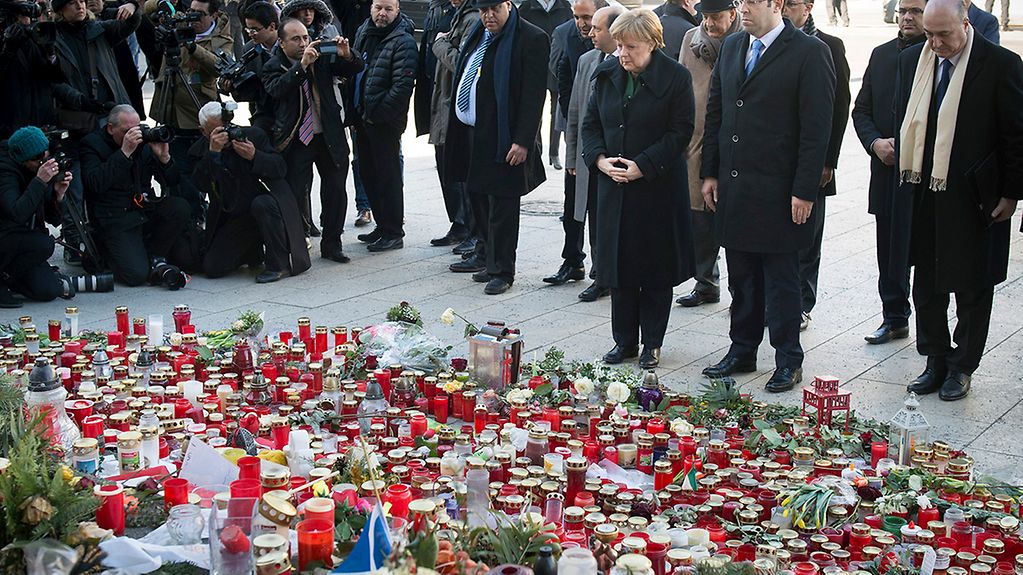Tunisian Prime Minister in Berlin
Germany and Tunisia want to promote the voluntary return of rejected asylum seekers. Among the approximately 30,000 Tunisians living in Germany, about 1,500 have no residence entitlement; it is intended to make their voluntary return more appealing, said the Chancellor after a meeting with Tunisian Prime Minister Chahed.
4 min reading time

Federal Chancellor Merkel received Tunisian Prime Minister Youssef Chahed with military honours
Photo: Bundesregierung/Bergmann
Following talks with Tunisian Prime Minister Youssef Chahed in the Chancellery, Federal Chancellor Angela Merkel emphasised that Tunisia, as a country neighbouring Libya, is particularly vulnerable to terrorist threats. Discussion between the two heads of government centred on the current security situation in the Euro-Mediterranean region, migration issues and German-Tunisian cooperation.

"We are terribly sorry about what happened in Berlin. All Tunisians were very touched by it," said Prime Minister Chahed
Photo: Bundesregierung/Bergmann
After the Chancellery meeting, Merkel and Chahed visited Breitscheidplatz, where they commemorated the victims of the terrorist attack of 19 December 2016. The Federal Chancellor said that the assault was a tragic link between Germany and Tunisia because the perpetrator was a Tunisian citizen.
Combating Illegal Migration
The Chancellor underlined at the joint press conference that illegal immigration must be combated. Efforts would be made to that end in a comprehensive partnership with Tunisia. She added that there had been discussion about promoting voluntary return in particular. It is conceivable, she said, that persons without residence entitlement could, for example, be offered educational services and financial start-up support.
Even before the Tunisian Prime Minister's visit, Merkel had commented on migration issues. She said that asylum application acceptance rates of Tunisian citizens arriving in Germany had been very low. "This is why we continue to speak up in the Federal Council for countries of origin to be recognised as safe: because we can then achieve legal clarity more quickly and also repatriate persons concerned more quickly."
Video
Promoting employment in Tunisia
Regarding economic cooperation, the Chancellor was very pleased that investment legislation had been addressed. As a result, framework conditions for investment had been gradually improved. She said examination would be made in the G20 Presidency of what could still be done in Tunisia.
The Federal Chancellor also spoke about one of the major challenges facing the Tunisian government: reducing unemployment. Among others, she said that the German G20 Presidency had envisaged a conference on economic development in Africa. Lastly, and importantly, she drew attention to the project of a German-Tunisian university.
The Chancellor said that labour market-oriented further education and training in Tunisia must be improved, including working conditions and greater competitiveness. Just recently, Merkel emphasised in a podcast: "We are aware of the great challenge of youth unemployment. I think that is the central issue. Consequently, we have repeatedly sought to promote 'dual vocational education' in collaboration with German firms in Tunisia."
The German Society for International Cooperation (GIZ), acting on behalf of the German federal government, offers support for numerous programmes to bolster economic performance in Tunisian regions. Especially in disadvantaged areas, close cooperation between businesses and civil society aims to create employment opportunities for youth. This end is to be achieved by further training measures, including temporary stays of skilled workers in Germany.
Tourism
The tourism sector, with its GDP share of seven per cent, is of great importance for the Tunisian economy. About 400,000 jobs depend on it. Previously, 15 per cent of tourists were German. Two terrorist assaults on tourist destinations in March and June 2015, as well as a bombing attack on a bus of the presidential guard in November 2015, for which the Islamic State (IS) admitted responsibility, set back the tourism sector. Up to beginning September 2015, the number of European tourists declined by 72 per cent. Revenues in the tourism industry, and as a result foreign exchange earnings as well, fell by a third.
Regarding this, the Federal Chancellor said in her podcast: "We also have to help Tunisia to cope with this terrorist threat because tourism, an economic branch of great importance for Tunisia, naturally depends very greatly on the security situation. And that's why we will carry on with our security partnership."
Development Cooperation
Germany is a Tunisian partner in development cooperation. As a consequence of the Jasmine Revolution in Tunisia in 2011, payments were increased from 37.5 million Euros in 2010 to 215 million in 2015.
Under the terms of the transformation partnership with Tunisia, more than 100 projects in Tunisia have been sponsored at a cost of more than 75 million euros in the period from 2012 to the present. The focus of these measures, which are to continue in years ahead as well, includes promotion of rule of law and good governance, employment promotion and dual training, civil society and professional media.